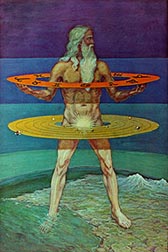Tapestry
of the Gods
Volume III
by Michael D.
Robbins
Astro-Rayology
in
progress
Interpretations
of Famous People by Ray, Sign and Life Emphasis
With Explanations of All Astrological and Rayological Elements

Saturn in Pisces


Saturn in Pisces or Saturn in Relation to Pisces
(from Esoteric Astrology)
(Spiritual Responsibility) (EA 333)

Specific Expressions of Saturn in Pisces
1. Saturn (in Pisces)
in Relation to the Etheric-Physical Vehicle:
Pisces rules the feet, in relation to which difficulties may occur. Thinking
analogically, this can affect a person’s ‘stand’ or
‘standing in life’, and how he “treads the path”.
When Saturn is involved, the bones of the feet may be the source of difficulty.
In a deeper sense, Pisces rules the entire lymphatic system, and given
Saturn’s tendency to cause precipitation, there may appear a hardening
of the lymph nodes, and, in general, obstructions to the secretion and
distribution of lymph. By reflex action, Pisces is involved with all members
of the Mutable cross; thus the lungs (under Gemini), the small intestine
and abdomen (under Virgo) the thighs and the motor nerves (under Sagittarius)
may all be indicated. In certain ways, Pisces sensitizes the body, and
makes it weaker and more vulnerable. The effects of physical karma (Saturn)
come home to roost in this sign of finality (Pisces).
2. Saturn (in Pisces)
in Relation to the Astral Vehicle:
Both Saturn and Pisces are karmic indicators. Saturn is law,
and Pisces represents the necessity to face, at last, the causes set in
motion earlier upon the wheel of experience. Lives lived under a prominent
Saturn in Pisces are filled with the reaping of karma. During these lives,
so often one “does not get what one wants.” This can lead
to sadness, melancholia and, even, depression. Dealing with these disappointments,
however, is really initial training for the “death of desire”
which occurs at the second initiation, but the human being upon the Mutable
Cross does not realize this, and simply interprets the dissatisfactions
which occur as hurtful disappointments and as reasons to become “dispirited”.
Saturn in Pisces represents, ordinarily, disappointments (Saturn) in the “wish-life” (Pisces). But upon the Path of Discipleship, when the Law of Sacrifice has been consciously appropriated, it may prove a most useful combination for promoting relinquishment and later, deliberate (Saturn) renunciation (Pisces). One can build in the attitude of dispassion and detachment when faced with privation.
There can come the realization that it is not the satisfaction of desire that promotes real inner happiness (joy), but, rather, detachment from worldly desire, and disengagement from the snares of the three worlds. Under this influence, one learns also how to face long-standing emotional conditions, and resolve them. Karma has been defined as “unfinished business”, and certainly this combination, helps one bring such business to an end—for both Saturn and Pisces are ‘terminators’.
3. Saturn (in Pisces)
in Relation to the Mental Vehicle:
This combination is not particularly related to the mental plane.
The Piscean ‘atmosphere’ is characterized, predominantly,
by the second and sixth rays, with only Pluto conferring the first ray.
However, in the facing of karma (so necessitated by this position) much
is learned, and the mind becomes more illumined. With the help of the
mind there are developed what might be called ‘strategies for conclusion’
or ‘strategies for termination’. The mind becomes retrospective,
and through careful examination of memory, comes to understand how these
karmic condition arose.
There may be a dogged determination to understand particular unfortunate incidents in the life (or lives) with the purpose of extracting their meaning to the whole. The basic approach could be called, ‘illumination through retrospection’. Thus, Saturn in Pisces helps one learn from the past so that in the new cycle (commenced in Aries) he will be wise enough not to repeat the same mistakes.
4. Saturn (in Pisces)
in Relation to the Personality as a Whole:
Upon the Mutable Cross, one with this position in high focus
may feel frustrated and defeated—a “victim of fate”.
With an almost palpable fatigue, he does what he must do, and not what
he wants to do. Circumstance is burdensome and no relief is in sight.
He lives in the feeling that it is “all over” for him. It
is quite impossible, at this early stage, to understand the training that
is being administered by this conventionally “unfortunate”
combination.
Later in the evolutionary cycle, we have the spiritually responsible disciple—the one who is rapidly learning self-effacement; to ask nothing for the separated self; and to face the handicaps of karma with patience and realism. There may be very great courage with this placement, but it is ‘courage in the closet’. No one sees and knows but the individual and his soul.
This combination does represent the end, but endings can be carried forward in a; responsible, wise, and thorough manner so that past no longer has the power to retard progress. Quietly and with solemnity, such an individual sets about the laborious and often depressing work. If he is sufficiently advanced to have accomplished this labor with respect to his own personality, he labors on behalf of humanity to help resolve long-standing karmic situations in human society. His is the duty (Saturn) to serve and save, regardless of the consequences for his personality.
5. Saturn (in Pisces)
and the Presentation of Opportunity on the Path of Discipleship:
If difficulty is opportunity, the life of the disciple with
a high focus Saturn in Pisces is full of opportunity. Most handicaps are
of our own making; they are always attached to the one who generated them,
and await the day of return. Under this influence, the wrong inceptions,
unresolved inharmonies, and unpaid debts “return-to-sender”.
Opportunity is presented to create greater freedom for the incarnated
soul. If the karmic chains are broken, freedom comes. But many of these
chains are very subtle—not the obvious ball and chain of the dungeon.
It may take patience and psychological examination to discover what they
really are. Saturn in Pisces confers this patience, and the determination
to “straighten out the mess I have made.”
6. Saturn (in Pisces)
and Choices to be Made and Destruction to be Endured in order to Promote
a Freer Expression of the Soul:
The choices concern whether or not one has the courage to deal
constructively “with all this”; whether one will be thorough
in the execution of final duties; whether one will have the courage to
face the ghosts, deal with them honestly, truthfully, according to one’s
highest principles—and move on and through.
The destructions are frequently of everything that one has built during the previous cycle. Under Pisces, the energies which cause pralayic dissolution are strengthened. Despite one’s best efforts to “hold things together”, they fall apart. Pluto cuts the links which bind persons, places and things in relationship. The “world ends”. But under Saturn, one realizes that the end is simply a prelude to another beginning, and that one must end properly, responsibly, and by extracting as much learning as possible from the ending. One realizes that endings are unavoidable, but the honor (and soul growth) lies in how one ends.
7. As “the sacred
planets endeavour to fuse the personality and make it the instrument of
the soul and the non-sacred planets influence more specifically the form
nature”, how does Saturn, a sacred planet, fuse the personality
and make it a responsible instrument of the soul in this particular sign?
How does it enforce the law(s) of the soul, and assist in the fulfillment
of the Purpose, Plan and Dharma conceived by the soul?:
Under this influence, there come the final purifications on
the Fixed Cross, and the relinquishment or destruction of those personality
factors which prevented the fusion process. Ancient, soul-obstructive
habits of behavior are finally terminated. The inner voice says, “Stop”,
and one does. It would be hopeless and futile to do otherwise. The ahamkaric
principle is in process of defeat. The personality fuses under the demand
of selfless service. The soul in-fuses the personality, because the personality
has given up is own selfish, personal will, and is now more interested
in the Divine Plan than in itself. Thus, the lower ego is no longer in
the way of soul-personality fusion.
This is an excellent combination for achieving self-effacement. One learns under Saturn in Pisces, that the personality is not important at all; it is a instrument to be used by the higher will—merely an instrument—and it is expendable. With all thought of self and its personal satisfactions now relinquished, the individual becomes a living example of “spiritual responsibility” (EA 333) He does “what must be done”, attending to his duty, aligning with the Laws of the Soul (all five of which are manifesting practically through his nature). In a way he has no personal purpose, plan or dharma. It is the purpose of the Ashram; the plan of the Master; and the dharma of simply meeting the need, which command his attention. He has become the dutiful servant of the soul, and he serves by applying himself laboriously (Saturn) to the salvation (Pisces) of humanity.
8. Miscellaneous Meanings of Saturn in Pisces: Fulfill your obligation to save; surrender what you must.
a. The “Great Sacrifice”
b. Saturn in Pisces is the symbol of “final days”, and of the “end (Pisces) time (Saturn)”.
c. The planet of Karma in sign revealing the end of a karmic cycle.
d. Fulfillment of karma; opportunity for release; Release from the Mutable Cross
e. The ending of the karma of the human family; resonant with the fourth degree
f. “Consummatum est”
g. The ending of desire, glamor and illusion
h. The responsibility of tying up one’s affairs
i. The courage induced by the vision of finality
j. Resignation and surrender
k. In this world and yet not of the world.
l. Looking back into the past and learning not to repeat the mistakes. Redeeming karmic residues. Repentance Learning from endings; “doing it right at last”; Making up for what you’ve done in the past, repentance
m. Edgar Cayce—reading the records-
n. Retributive karma; karmic limitation
o. Forced termination
p. Compulsion to terminate
q. Great spiritual discipline; sense of duty very strong
r. Righting a wrong—setting the record straight, at last
s. Self-abnegation
t. Idealism as a responsibility
u. Prior to second degree—relinquishment of desire.
v. Monasticism; priests, nuns, cloisters
w. Self-effacement
x. A position demanding humility and much sacrifice.
y. Separation from matter
z. Isolation
aa. The obligation to work with the handicapped and those who are deprived
bb. Reticence
cc. Secret sorrows; depression unto death
dd. Poverty and deprivation
ee. Hidden responsibilities
ff. “No-exit”—Sartre
gg. Karmic debt; final duties
hh. “I have to do it”.
ii. Speech correction
jj. Stand firmly on feet and take responsibility; or feel like a victim and blame others for hard life or misfortune.
kk. Skeleton in the closet and ghosts also; haunted by unfulfillment
ll. Difficulty taking responsibility
mm. Facing emotional traumas. Unfinished business.
nn. Depressive, lonely.
oo. Karmic difficulties with the feet; weakness there
pp. The karmic dregs
qq. Resignation

Individuals with Saturn in Pisces
14th
Dalai Lama
Czar
Alexander II
Woody Allen
Susan B. Anthony
Alexander Graham Bell
Annie Besant
Luther Burbank
Catherine the Great
Edgar Cayce
Isadora Duncan
Thomas Alva Edison
Jane Fonda
Mata Hari
Herman Hesse
Karl Marx
Sir Isaac Newton
Sir Lawrence Olivier
Vanessa Redgrave
Dr. Francis Regardie
Maximillian Robespierre
Jean Paul Sartre
Arthur Schopenhauer
Upton Sinclair
Henry David Thoreau
Queen Victoria
Walt Whitman

Astrological
Interpretations
by Michael D. Robbins
commentary and projects
by Michael D. Robbins
to the University of the Seven Rays
to
Makara.us home
updated February 2008


